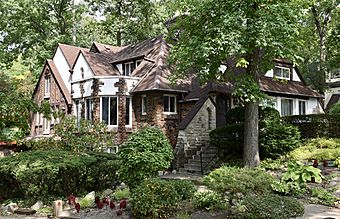Merritt Woods Historic District facts for kids
Quick facts for kids |
|
|
Merritt Woods Historic District
|
|

209 Emmett St.
|
|
| Location | Roughly bounded by Orchard, Emmett and Chestnut Sts. and northernmost parts of Woodmer Dr. and Crest Dr., Battle Creek, Michigan |
|---|---|
| Area | 13 acres (5.3 ha) |
| Architect | Adelbert B. Chanel, Edward X. Tuttle |
| Architectural style | Colonial Revival, Tudor Revival |
| NRHP reference No. | 94000622 |
| Added to NRHP | June 17, 1994 |
The Merritt Woods Historic District is a special neighborhood in Battle Creek, Michigan. It's known for its beautiful old homes and unique design. This area was added to the National Register of Historic Places in 1994 because of its important history and architecture.
Contents
History of Merritt Woods
The Merritt Woods neighborhood started in 1921. A group of important people from Battle Creek bought 23 acres of land. One of them was an architect named Adelbert B. Chanel. He designed nine of the houses in the area.
They planned the neighborhood carefully, making large lots that followed the natural shape of the land. The ground was prepared in 1923. By 1927, the first two houses were built. Two more were added in 1928.
Building During Tough Times
Building slowed down because of the Great Depression, a time when many people lost their jobs. It wasn't until 1931 that four more homes were built. Eight more houses were added in the 1930s.
Then, World War II started, which again stopped new construction. Building began again in 1948, when three more houses were finished. One house was built in the 1950s, and the last two were added in the 1960s.
What Makes Merritt Woods Special?
The Merritt Woods Historic District has 23 homes. Eighteen of these homes are considered "historic" because they show the original style and age of the neighborhood. The houses are on very large lots with interesting, uneven shapes.
Nature and Design
The district is full of old, tall trees like oak, hickory, and slippery elm. The streets are gently curved, following the hills and valleys of the land. The houses are set far back from the streets, usually 30 feet or more.
Most of the homes are two stories tall. They are built in popular styles like Colonial Revival and Tudor Revival. Many are made of brick or stone. Some have upper levels covered with stucco, wood, or shingles. All the homes are single-family houses and have garages attached.

